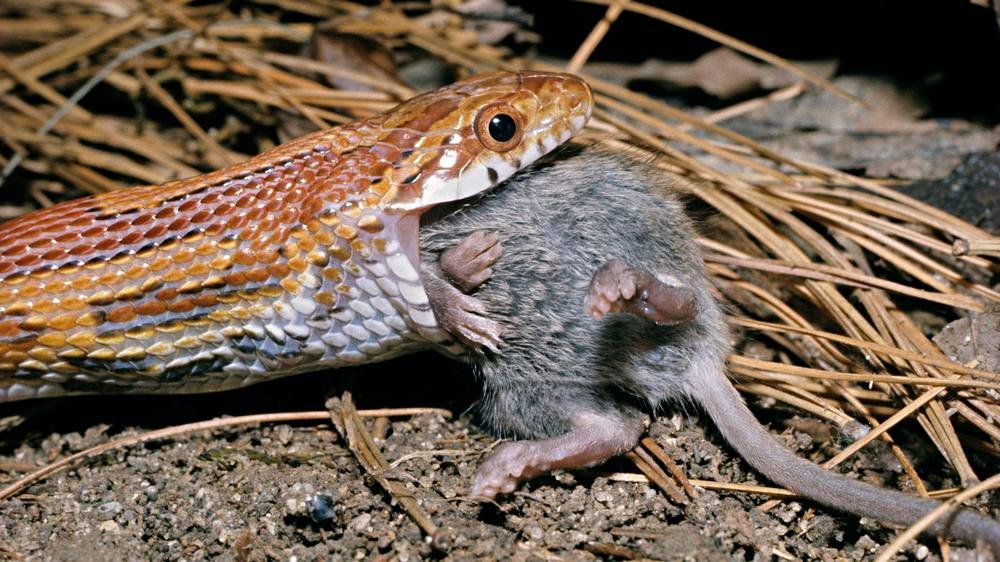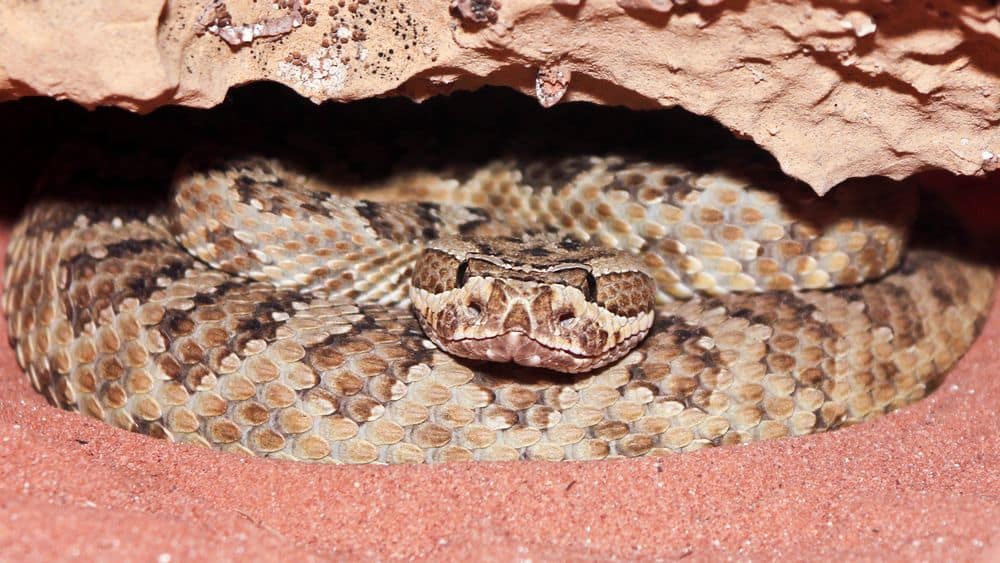
But most snakes are completely harmless.
In fact, these reptiles quietly keep nature in check.
You might be surprised at just how much they do for the world around us.
Snakes are vital to ecosystems. They control pests, support biodiversity, and keep environments healthy for both plants and animals.
Whether it’s in your backyard or a wild forest, snakes help the environment in ways that make life better for other species—and even for us.
How Snakes Help The Ecosystem
Let’s take a look at 9 important ways snakes help maintain the delicate balance of the natural world.
1. Control Rodent Populations To Reduce Crop Damage

Snakes are nature’s pest control in gardens and fields. They hunt mice, rats, and other small mammals that love to munch on crops.
Adult brown snakes can eat around 200 mice each year. That’s a lot of hungry rodents taken off your land.
Rodents chew through roots, stems, and fruits, making a mess of your harvest. They even contaminate stored seeds and grain.
Snakes keep rodent numbers down, which means less crop damage and contamination. Your harvest ends up healthier, and you save money.
With snakes around, you don’t need to rely as much on poison or traps. Their hunting helps control pests that would otherwise cause big problems.
By controlling rodents, snakes help crops thrive with fewer chemicals. They’re like free, tireless workers—on the job day and night.
2. Lower Spread Of Diseases Like Lyme Disease By Preying On Tick-Carrying Rodents
Snakes help lower your risk of tick-borne diseases. They eat mice and other small rodents that carry ticks infected with nasty bacteria.
Lyme disease is a bacterial infection spread by deer ticks, and those ticks often feed on mice before finding humans. When snakes eat mice, they break this disease cycle. Fewer mice means fewer ticks—and less risk for you.
Wild mice are the main tick hosts. When there aren’t enough natural mouse predators like snakes, tick-borne diseases spread more easily. Your local snakes act as a built-in pest control system, keeping rodent numbers balanced. No chemicals needed.
Scientists have seen patterns linking mouse populations to disease outbreaks. More mice means more ticks, which means more risk for your family.
Protecting snakes helps keep this natural balance. It’s a simple way to help keep dangerous diseases out of your neighborhood.
3. Maintain Balanced Food Chains As Both Predator And Prey

Snakes have a double role in nature. They hunt smaller animals like rodents and insects, but they’re also prey on bigger animals. This makes snakes important links in the food chain. They connect different levels of the ecosystem.
When you spot a snake eating a mouse, it’s helping control rodents. But that same snake might end up as lunch for a hawk or fox.
Snakes keep the food web balanced through this predator-prey relationship. More rodents mean more snakes, which means more food for their predators.
This cycle keeps everything in check. Without snakes, the food chain would have gaps, and other animals might struggle to find enough to eat.
4. Reduce The Need For Chemical Pest Control In Gardens
Snakes are natural pest controllers in gardens, eating rodents, slugs, and insects. That means you can use fewer chemical pesticides.
When snakes hunt garden pests, you get a healthier balance. You won’t need to spray as many chemicals that could harm helpful insects.
Organic gardeners especially love having snakes around. They provide a natural solution that works with other beneficial creatures. Your crops stay safer when snakes keep rodents in check. It’s pest control without the hassle.
By preying on pests, snakes help you skip the chemicals. That’s better for pollinators and your soil.
5. Help Protect Plant Roots And Fruits By Eating Plant-Eating Pests

Snakes protect your garden plants by eating creatures that would otherwise damage roots and fruits. They’re the silent guardians underground.
Rodents like mice, rats, and voles love to chew on roots. They can wreck entire crops by eating the parts plants need to survive.
Snakes help plants thrive by keeping these rodents in check. Fewer pests means stronger, healthier plants.
Many snakes also eat insects that harm plants. Beetles, grubs, and other bugs become snake food.
Rodents and insects can do a lot of damage to roots, leaves, and fruits. Snakes keep those numbers down. With snakes around, your plants have a better shot at growing strong roots and reaching maturity. Fruits and veggies get a fighting chance.
This all happens naturally, no chemicals needed. Snakes just do what they do best—hunt pests.
6. Support Biodiversity By Influencing Population Dynamics
Snakes are nature’s population managers. They hunt a variety of animals, keeping numbers in check. When snakes eat rodents, birds, or insects, they stop these populations from exploding. This balance keeps our ecosystem healthy.
Without snakes, some species would multiply too fast. That could hurt plants and other animals that share the same resources.
Snakes also end up as food for bigger predators like hawks and foxes. They’re important links in the food chain.
Their role as both hunter and prey helps many other species. When snakes thrive, so does the rest of the ecosystem. Wildlife tends to be more varied when snakes are around. They help stop any one group from taking over.
This natural balance supports biodiversity in your area. More diversity means a stronger, healthier environment for everyone.
7. Serve As Natural Ecosystem Engineers Through Their Activities

Snakes are ecosystem engineers—they actually change the landscape. That’s not something most people realize.
Burrowing snakes do a lot of work underground. When they dig through soil, they aerate it, making it easier for plant roots to grow and for water to soak in. Your garden benefits from this. The underground work may seem small, but it’s key for healthy soil and strong plants.
Snakes do more than just hunt. Their engineering activities physically change their habitats in helpful ways. Habitats get more complex thanks to snakes. This extra complexity supports more biodiversity than you might think.
It’s fascinating to see how snakes shape the world around them. Their everyday work helps create better homes for plants and animals alike.
8. Contribute To The Survival Of Their Predators By Being A Food Source
Snakes are a major food source for lots of animals in your local ecosystem. Birds of prey like hawks and eagles hunt them all the time.
Mammals such as foxes, raccoons, and even other snakes rely on them for nutrition. This intermediary role in the food chain keeps predator populations healthy.
When snakes are available as prey, predator species can find enough food to survive. Without them, many predators would struggle to get by. The availability of snakes as prey supports the survival of many predators. It’s a key part of keeping your ecosystem diverse and healthy.
Young snakes are especially important for smaller predators and birds. Even snake eggs feed animals like lizards and small mammals.
This feeding relationship creates a complex food web where snakes support multiple species higher up the chain.
9. Promote Healthier Environments Where Plants Can Thrive

Snakes make your garden a better place for plants. They help keep the natural balance that lets plants grow strong and healthy.
When snakes hunt pests, they protect roots, leaves, and fruits from getting chewed up. Rodents and insects can wreak havoc on plants, but snakes keep these troublemakers under control.
You’ll often see more types of plants where snakes live. Snakes help create environments where plant life flourishes by removing threats that would otherwise harm vegetation.
When snakes are around, you don’t need as many chemical pesticides. Plants get to grow in cleaner soil, without all those harsh chemicals messing with them.
Garden snakes help control pests and increase plant variety, which keeps your natural environment healthy. Plants have a better shot at spreading and reproducing when snakes fend off hungry pests.
Your plants benefit from the stable ecosystem snakes help create. With fewer plant-eating pests, vegetation can focus on growing instead of constantly recovering from damage.
Understanding Snakes’ Ecological Roles
Snakes play both predator and prey in the ecosystem, adding stability through their hunting and being hunted. They target certain pest species and also provide food for bigger animals.
Natural Pest Control
Snakes act as natural pest controllers in your area. They hunt rodents, insects, and other small animals that damage crops or spread disease.
A single snake can eat dozens of rodents every year. This helps control pest populations without needing chemicals or traps.
Common prey species include
- Mice and rats
- Insects and grubs
- Small birds
- Frogs and toads
Different snakes go after different pests. Garter snakes hunt slugs and insects that ruin gardens. Rat snakes focus on rodents in barns and storage sheds.
This natural pest control saves money for farmers and homeowners. You won’t need as many pesticides with snakes keeping pests in check. Snakes often hunt at night when pests are most active. They can reach spots that traps and poison just can’t handle.
Balancing Food Webs
Snakes fill two roles in food webs: predator and prey. This maintains balance in ecosystems by stopping any single species from taking over.
If prey populations get too big, more snakes survive and reproduce. That puts pressure on the prey and brings their numbers back down.
Animals that eat snakes include
- Hawks and eagles
- Owls
- Mammals like foxes
- Other snakes
When snake numbers rise, more predators show up to eat them. These predators then help keep snake populations in check.
Forest ecosystems rely on snakes to keep a variety of species in balance. Without snakes, some prey animals would eat too many plants or crowd out others.
That balance supports biodiversity in your local environment. More species can actually coexist when snakes help regulate populations.
How Snakes Contribute To Biodiversity
Snakes help maintain biodiversity by controlling animals that could otherwise ruin plant life and soil health. They also help create stable environments where rare species can survive by keeping the ecosystem in balance.
Supporting Healthy Habitats
Snakes help maintain biodiversity by working as both predators and prey. This balance creates good conditions for other wildlife.
In healthy ecosystems, snakes work behind the scenes. They hunt rodents, birds, and insects that might otherwise take over. Without that control, some animals would eat too many plants or mess up the soil.
Key biodiversity benefits include
- Stopping any single species from dominating
- Making room for rare animals to survive
- Keeping food chains stable
- Supporting complex habitat relationships
Their predatory instincts provide a stable environment for endangered creatures to thrive. That support really matters for global biodiversity.
Many snake species also serve as food for mammals, birds, fish, and other reptiles. They connect different animal groups in the food web.
Influence On Plant Growth
Many snake species help regulate populations of smaller animals that may otherwise become overly abundant and disrupt plant life or soil health. Your local plant communities depend on this natural pest control.
Rodents and insects can quickly destroy crops, gardens, and wild plants if their numbers explode. Snakes help by hunting these animals regularly.
Plant protection benefits
- Less crop damage from rodents
- Reduced insect destruction
- Protection for tree seedlings and roots
- Healthier soil conditions
When snakes control slugs, your garden plants get less leaf damage. They also protect tree roots from being gnawed by too many rodents.
Snakes feed on various species including rodents and slugs, thus controlling populations that could otherwise damage crops and disrupt ecological balance. This natural pest management helps wild plants and farm fields thrive.
Snakes And The Ecosystem: Conclusion
Snakes play a vital role in keeping nature balanced. They’re both hunters and prey for other animals. This makes them essential for maintaining biodiversity in your local area.
Key Benefits You Should Remember
- Control rodent populations naturally
- Reduce disease spread from small mammals
- Keep insect numbers in check
- Provide food for birds and other predators
- Help maintain healthy plant communities
When you spot a snake in your yard or garden, it’s usually doing important work. Snakes act as natural pest controllers and help cut down your need for chemicals.
Without snakes, rodents and insects can multiply quickly. That hurts plants and lets more diseases spread. Making your garden more snake-friendly is never a bad idea.
Your understanding of snakes really matters. The more you know about their benefits, the better you can protect them. Both adding and removing snakes can have unexpected effects on your local environment.
Supporting snake conservation helps your whole ecosystem stay healthy. These reptiles have balanced nature for millions of years, and honestly, they deserve a bit of respect.
Leave a Reply